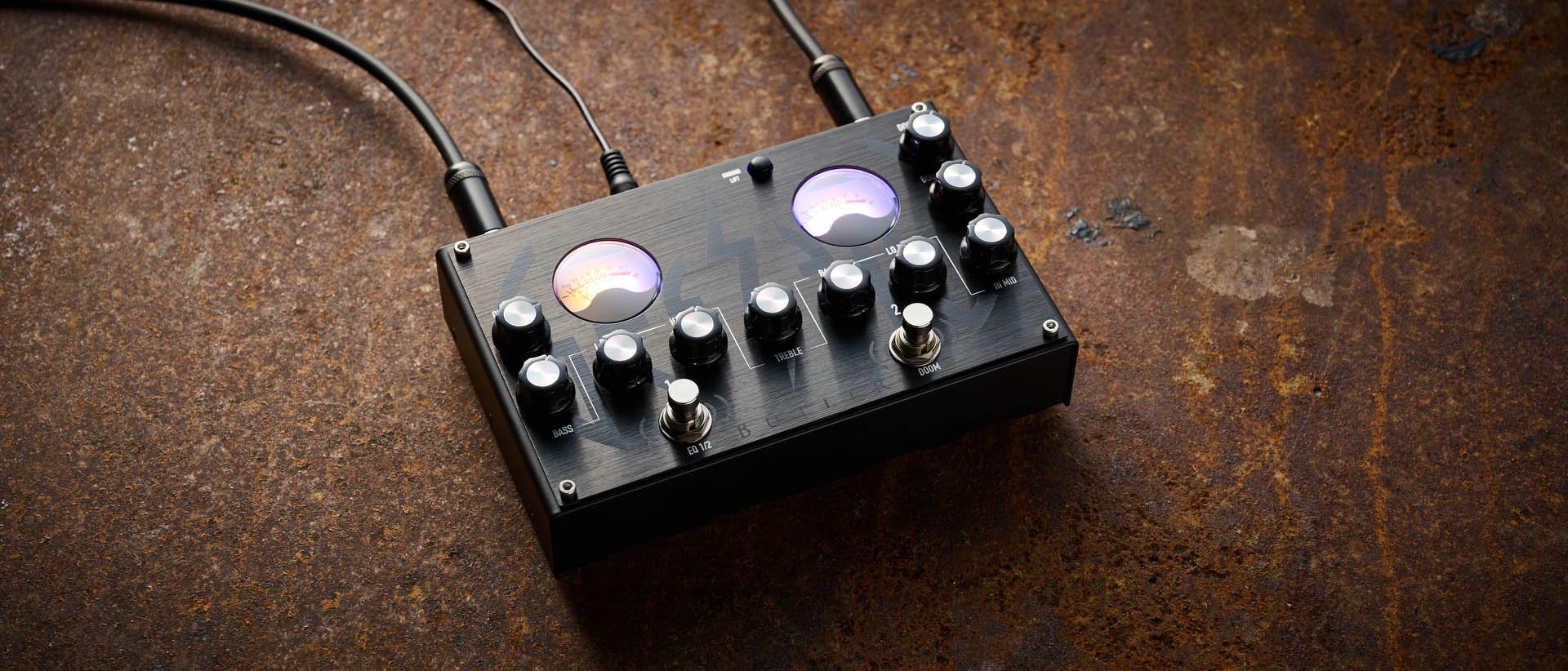Love And Death: “Our new music feels like a step up – it’s been a six- or seven-year process of collecting riffs”
Brian 'Head' Welch and JR Bareis talk pedals, dreadlocks, Love And Death's forthcoming album Perfectly Preserved, and the future of Korn post-pandemic
![[L-R] Brian 'Head' Welch and JR Bareis of Love and Death](https://cdn.mos.cms.futurecdn.net/7xWZcCPZGsg8hdoxMVAJag.jpg)
“We’re excited and pumped up… just trying to make the best of this crazy little era we’re living in,” says Love And Death frontman Brian ‘Head’ Welch – also of Korn – when Guitar World congratulates him and co-guitarist JR Bareis on their latest release.
The pair are currently promoting second album Perfectly Preserved which, come to think of it, would also be a fitting description for the long dreadlocks sported by both musicians…
“I don’t know if mine are perfectly preserved,” laughs Welch. “I just wash them once a week and cut them every four months. They are different lengths, some are long and some are short. J.R.’s are huge. He’s like the frickin’ Gandalf of dreads.”
“I have a friend who fixes them up for me once in a while,” adds Bareis. “They can get a little crazy with all the loose hair. I don’t think there is a secret though, you just have to go for it.
“Once it all starts locking, it just goes from there and stays like that. There’s not too much work involved, which is nice. I never know when to cut them! I don’t want to lose the length [laughs].”
“As soon as you find feces on them after going to the bathroom, it’s time to cut,” deadpans Welch. “I’m just joking. That never happens. It’s an old wives tale…”
The pair had first become acquainted in 2011 when Welch had left Korn and was looking to relaunch his musical career.
All the latest guitar news, interviews, lessons, reviews, deals and more, direct to your inbox!
He needed another guitarist for the project and thanks to a mutual contact on Facebook along with some impressive content on YouTube, Bareis was contacted about them working together. There was only one slight problem, they didn’t know he was just 15 years old at the time…
“Well, he was my only option,” laughs Welch. “I didn’t have many other choices, either cancel a tour or have this teenage kid play with us. I actually thought he was in his early 20s when I saw his videos online. He sounded tight and like he was enjoying what he does. Then we called him and found out he was 15. That was a shocker.
“The next shock was his parents saying, ‘Sure, take him on the road!’ They had found out about my story and how I’d cleaned up my life, so I think they trusted me to be a positive influence.
“Our tour manager was like the tour father that would take care of all of us. He signed a piece of paper that made him a legal guardian of JR, which I signed too, so we were both responsible for him when he was with us. That was a trip… it was meant to be! We’ve been working together ever since.”
It must have been pretty mind-blowing for you, JR – especially being in your mid-teens at the time?
JR: “I had that YouTube channel and would do guitar covers for fun. I had a friend on Facebook that was also friends with Brian’s tour manager at the time, back when he was looking for a guitarist in his solo project.
It’s crazy, but that’s how it happened, through social media. It’s also crazy because I didn’t listen to Korn growing up…
JR Bareis
“They saw the video and hit me up, so we got connected and talked. It’s crazy, but that’s how it happened, through social media. It’s also crazy because I didn’t listen to Korn growing up…”
Brian: “Hey, what do you mean?! You better lie to them and tell you were a big fan… just joking [laughs]!”
JR: “I guess people think that I was, but I grew up in a Christian home so I didn’t listen to secular music that much. So really the first time I heard Korn was when I started talking to Brian and had to learn parts for this Korn medley thing we would do! Now I love their music.”
What felt different about the creative process for this new album?
Brian: “For this record, I wanted JR to step up and do more singing and writing. So me and him would be texting back and forth with lyrics and melodies, just going for it.
“We also got together with Jasen Rauch, who is a producer and also in Breaking Benjamin. He produced the first Love And Death record and EP, we started working together in 2011. This new music feels like a step up, the songs are written better with bigger hooks and the whole mix of everything is an improvement.”
JR: “We started writing back in 2014, so it’s been a six or seven year process of collecting riffs. There’s so much we didn’t end up using. Then we wrote a lot of stuff last year too, right before we started tracking.
“I would stay with Jasen a couple of times through the years, we would hammer things out and work on stuff. Then around July last year, all the songs felt cohesive and ready for tracking.
“A lot of it was done on FaceTime, so I’d fly out to track the guitars and would call Brian and Jasen to see what they thought. It was all over the phone or email. We didn’t sit in the same room.”

So it was more collaborative than the first Love And Death record?
Brian: “At other points, I wrote stuff with Jasen and Keith Wallen, who also plays in Breaking Benjamin doing guitars and some vocal stuff.
“Jasen was actually living with me, he’d gone through a break up, so Keith would come over for a weekend or even a week and we came up with about three songs that way. Like JR said, there was so much we threw away… and I have to say, most of that was stuff I wrote!
“In music, you have to have humility. When you work with people you have to stay humble. There was a song called Carousel that I loved, my daughter wrote a little part of it.
“We got Joe Rickard involved – who played in Red and In Flames and now produces – and he came in saying we would have to get rid of it. He felt it didn’t stand up to the rest and I trusted him. Keith Wallen came in and wrote some more with Joe, and Jasen threw his portion on there and then I added my flavor before JR added his…
“You have to stay grounded writing music like this. Collaborating is the best! Other people hear things and come up with ideas that I don’t myself. The same goes for Korn, with Fieldy coming up with amazing rhythmic ideas and riffs and Munky coming up with all that unique Korn-sounding stuff.
I love playing guitar in Korn, that’s my number one and where I feel most at home, obviously, but this is just another form of art. Singing and rocking out like that is fun… and it works
Brian 'Head' Welch
“I was really good at the choruses where Jonathan [Davis, singer] can soar, songs like Falling Away From Me. I also wrote that higher guitar hook, that’s what I was good at. But the other guys in Korn were able to make it even better and the same thing goes for Love And Death.”
It was interesting to see you fronting a band with no guitar at all in the video for [lead single] Down. Did that feel different for you?
Brian: “Great question… it was way different and nerve-wracking. I’ve always loved vocals and enjoy working with amazing singers. I wanted to try it myself but never could. When I left Korn, I really gave it my all and had a lot of fun. I prefer screaming to singing.
“We actually tried to film with me singing and playing guitar for that video but I’m not talented like JR who can do both at the same time. I put the guitar down and grabbed the mic! It’s definitely a different vibe.
“I love playing guitar in Korn, that’s my number one and where I feel most at home, obviously, but this is just another form of art. Singing and rocking out like that is fun… and it works. I thought it looked really good on the video.
“It was easy to get back into because we’d toured so much back in the day. It took a little while but I was feeling comfortable again. There’s our livestream show coming soon that I’m really looking forward to...”
The second single, White Flag, has a really interesting descending part against the chug in the main riff. Who came up with that?
JR: “I actually wrote that part back when I played in my old band Islander. We never used it because it sounded like Love And Death [laughs]. I’m stoked we got to use it, because it’s just fun, bouncy and chaotic-sounding.”
Brian: “Joe wanted to throw that song away! Me, Jasen and JR worked on the chorus about five or six years ago and when Joe wanted to lose it, I had to fight for that song. I was actually singing over JR’s riff but it didn’t work.
“So when we changed the vocals to screaming and suddenly everyone was like, ‘Yes, this is it!’ Right at the bottom of the ninth, I saved the song… because it was going to get canned.”
What are your tips to getting a good tone when using lower tunings with high gain?
Brian: “I have to give props where they are due, James ‘Munky’ Shaffer was the Steve Vai fan in Korn. He’s the one who went to Guitar Center and put down 50 bucks for the first seven-string back in 1990 or 1991. I had no idea what a seven-string was!
“So it was Munky who really grabbed hold of that. When I joined Korn and we put the band together, I got one too and Fieldy got a five-string bass. Steve Vai invented the guitar, but we invented this lower metal tuning.
We’re not trying to rip off anything – that’s just Brian's sound. But we took it and made it something different. These songs aren’t just Korn songs. They have their own sound
JR Bareis
“It was lower than Helmet, lower than Biohazard. And that became our thing. So many bands play in the lower spectrum now… the same goes for Love And Death, which is an extension of what I’ve been involved with and ultimately what I love. I’m all about the crushing riffs!”
So what kind of amps did you use to make them sound even bigger?
JR: “For this record we used a bunch of different ones. There was a Bogner, a Mesa/Boogie and a 5150, those were the three main heads. We also experimented with the Kemper profiler too, especially for overdubs and fun lead guitars. It was also used for a lot of Brian’s signature sounds, those weird vibe guitar noises.
“We’re not trying to rip off anything – that’s just his sound. But we took it and made it something different. These songs aren’t just Korn songs. They have their own sound.
“A lot of people try to compare the bands, but if it ever sounds similar, you’ve got one of the guys from the band… that’s just his style! But there are other people involved here that make this its own thing.”
Brian: “I told the guys this music had to have its own vibe. They are all massive talents, from JR to Jasen to Keith and Joe. I wanted all of our talents to shine through.
“Sure, you hear a bit of those weird ‘brrrrp’ noises and chords I do, but there’s also a lot of beauty in the melodies, plus electronic vibes, even poppy sounds thanks to JR’s voice.
“My screams and guitars are the taste of my own flavor, which partly relates to what me and Munky do. I think it’s a good balance. People that compare us to Korn should listen to the record and they will understand how it’s different.”

Pedal-wise, is there any new gear that’s been blowing your mind?
Brian: “I got hooked up with this thing called the [Chase Bliss Audio] Tonal Recall. It’s weird and amazing. It was actually the ex-drummer from Avenged Sevenfold, Arin Ilejay, who hooked me up with that.
“He’s started playing guitar and getting obsessed with it, then sent me this video of him playing Falling Away From Me. And I was like, ‘Dude, what is that pedal?!’ It’s become my new secret weapon. What’s your secret weapon, JR?”
JR: “I use Kemper mainly. I used to have a lot of different pedals, then switched to the Axe-Fx 2 and last year I made the move over to Kemper. It’s awesome and always sounds great, plus it makes so much sense for fly gigs.
“There’s no worry about backline gear not being good enough or them not having what you need. Brian gave me an MXR Uni-Vibe, the mini version, and I ended up using it a lot on this record.
“We used a Klon as well for an overdrive on all the guitars. We actually rented a real legit one that sounded great. It adds this extra ‘thing’ to the guitar that makes your tone awesome.”
And finally Brian, what’s next for Korn – do you think you will finish off The Nothing cycle when normality returns or perhaps start afresh?
Of course we all care about the record, but we can’t just pick up where we left off. We have to do something new and exciting…
Brian 'Head' Welch
Brian: “We’re talking and sending things back and forth, waiting to see what unfolds and working with management. When you aren’t touring with crew members and bus companies, you end up with a lot of time to come up with ideas. It could involve new music, we’re just going with the flow.
“A lot of bands are stuck at home working on music because there’s nothing else to do. Hopefully we can break through the noise with all the new music coming out, whenever that happens.
“I think M Shadows said it best, I read an article just last week when he said that if you put out a record over the pandemic, in a year from now or whatever, no one is going to care about that record.
“And I kinda think about The Nothing like that – it came out, we wanted to work it for two years and we couldn’t. Of course we all care about the record, but we can’t just pick up where we left off. We have to do something new and exciting… it’s just a case of figuring out what that is!”
Perfectly Preserved is out on February 12 via Earache Records. Love And Death will perform a livestream album release show that same day – tickets are available now.
Amit has been writing for titles like Total Guitar, MusicRadar and Guitar World for over a decade and counts Richie Kotzen, Guthrie Govan and Jeff Beck among his primary influences as a guitar player. He's worked for magazines like Kerrang!, Metal Hammer, Classic Rock, Prog, Record Collector, Planet Rock, Rhythm and Bass Player, as well as newspapers like Metro and The Independent, interviewing everyone from Ozzy Osbourne and Lemmy to Slash and Jimmy Page, and once even traded solos with a member of Slayer on a track released internationally. As a session guitarist, he's played alongside members of Judas Priest and Uriah Heep in London ensemble Metalworks, as well as handled lead guitars for legends like Glen Matlock (Sex Pistols, The Faces) and Stu Hamm (Steve Vai, Joe Satriani, G3).

